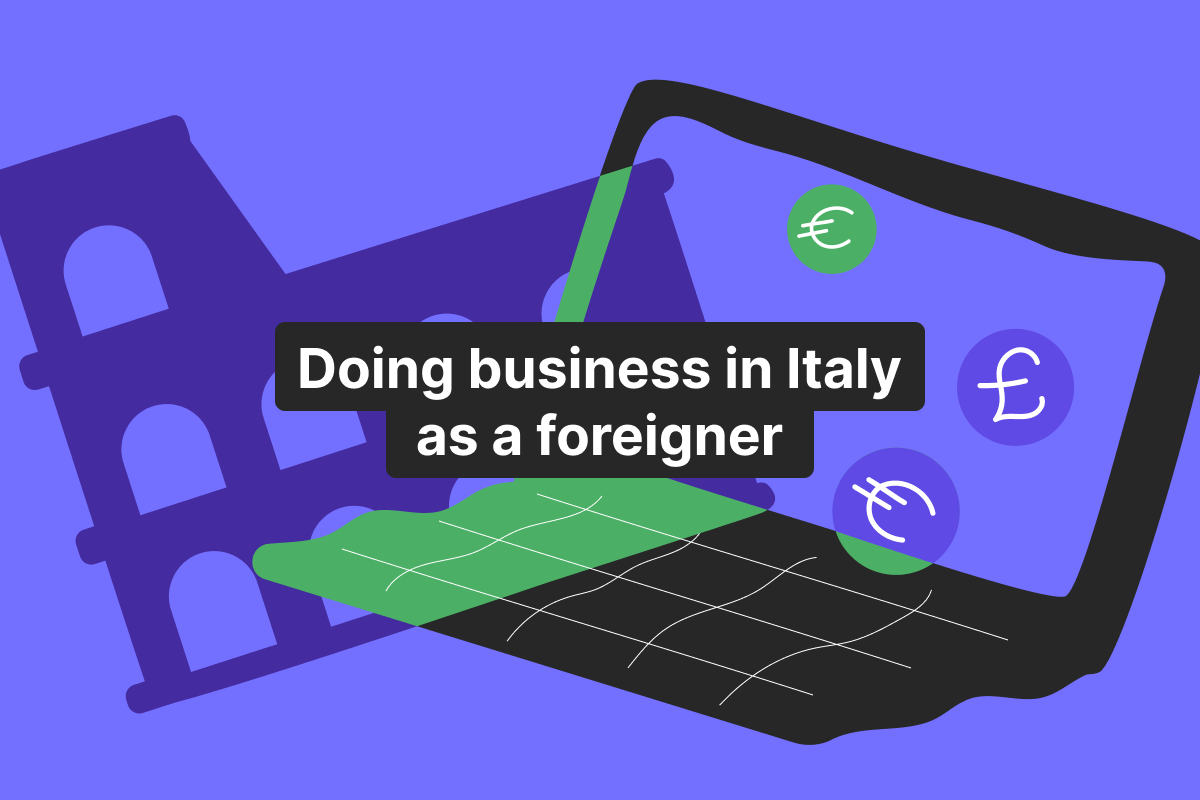Italy holds a great deal of appeal for foreign investors and entrepreneurs. With a strategic EU location, enviable lifestyle, and robust economic sectors, its appeal is easy to see. When it comes to starting a business in Italy as a foreigner, we’ll be looking at the key points to bear in mind that ensure a smooth start, covering all the requirements and processes.
Can a foreigner start a business in Italy?
Foreign investors can start a business in Italy, although the rules vary according to the person’s legal status. Non-EU citizens may require a business visa to get started before carrying out the steps listed below. EU citizens have a simpler process, as they do not need a business visa to start their own business.
In both cases, there are several steps to complete once the visa and residency requirements have been met. These include registering with the appropriate authorities and having a business plan in place. Suppose you’re going to start here for three months or longer when opening a business in Italy. You should register with the local comune. It indicates that you have been added to the civil registry as a legal resident.
Visa and residency requirements
There are various legal visa and residency requirements you need to meet to start your business in Italy. The main difference is between people who are European Union citizens and those who aren’t.
For EU/EEA citizens
The freedom of establishment in the EU means that no visa is needed for foreign investors starting a business here. Living here isn’t strictly necessary to start a business in Italy, but you’ll need to carry out the steps mentioned later in the article. If you stay longer than 3 months, you must also register with the local Anagrafe (civil registry).
For non-EU citizens
Anyone who isn’t a European Union citizen needs to obtain the appropriate visa to start the process of creating an incorporated business. The options include a self-employment visa, an investor visa, or a startup visa. You need a valid passport to start this process.
The startup and self-employment visas require you to make a certain level of investment and have a business that helps the Italian economy. The rules may change over time, and according to your situation, so doing market research and finding out the latest rules will help you pass this stage successfully. Keep in mind that:
The Investor Visa requires a fixed minimum investment, starting from €250,000.
The Startup Visa requires an innovative business plan and at least €50,000 in funding (self-funded or from approved investors/incubators).
The Self-employment Visa does not always require a fixed investment but instead proof of sufficient income, professional qualifications, and authorization from Italian authorities.
After obtaining a visa, you must also apply for a residence permit (permesso di soggiorno) once in Italy.
Choosing the right business structure
It is a step where the company’s legal form is established, with options such as S.r.l. and S.r.l.s. You need to take into account factors such as the minimum share capital and whether you’re a sole trader or a limited partnership.
The creation of the statutes and articles of association follows it. A business plan should be created to ensure the viability of the company’s idea.
Get Chamber of Commerce approval
An application needs to be submitted to the Chamber of Commerce and Industry. It is called the Camera di Commercio, and its acceptance formally establishes your company in the Italian business ecosystem. Your business in Italy will now be listed in the Italian Business Register (Registro Imprese).
Get a tax number
You need to get a VAT number from the Agenzia Entrate, which is the Italian Tax Agency. It enables you to conduct financial transactions. You can now pay corporate taxes and other minor taxes. You have to register the business for Partita IVA, which is the Italian version of VAT.
Open a business bank account
You’ll need a corporate bank account for your business activities in Italy. It lets you process business transactions, such as receiving payments and paying business debts. You don’t automatically need to open an account in Italy to do this. It’s possible to use an international account that lets you send and receive money across the world.
For instance, you can get a business wallet inside Genome with all major financial services included: SEPA Instant and Credit Transfers, multi-currency accounts, Visa business debit cards, and so much more.
Social security and insurance registrations
Once you have a tax code and a residence permit, you can register for social security payments and health insurance. The Azienda Sanitaria Locale (ASL) is the place to apply for the National Health Service (SSN) as well as register with the National Institute for Social Security (INPS).
You need to make sure you’re covered for work-related accidents, with unlimited liability. The National Institute for Insurance against Accidents at Work (INAIL) covers work-related incidents.
Sort out the licenses or permits you need
Italian companies may need additional licenses or permits to operate. It depends on the type of business you plan to open and where you’re based, so you should check the current Italian laws to find out what is needed before going any further.
Taxes and ongoing compliance
Taxes are among the most important issues to resolve when you enter the Italian market with a new business. If you don’t deal with this aspect correctly, you could become tangled in legal problems later.
The Corporate tax rate (IRES, or imposta sul reddito sulle società) for a business in Italy is set to 24% at the time of writing. It is the corporate income tax you need to pay to the Italian government based on the profits you make in the country.
Regional production tax is known as IRAP (imposta regionale sulle attività produttive). This rate varies across the country and is typically close to 4%. Not all businesses are subject to IRAP, as exemptions may apply depending on the activity and structure.
The standard rate of VAT is charged at 22% across this country, although there are some reduced rates that apply to areas such as hotels, pharmaceuticals, and certain types of food and drink.
Annual reporting requirements include a balance sheet together with a profit and loss statement. These need to be approved within 120 days after the fiscal year-end (or 180 in some cases) and filed with the Italian Company Register within 30 days of approval. Tax returns need to go to the Agenzia delle Entrate no later than 11 months following the end of the fiscal year, with advance tax payments also required during the year.
Key costs to consider
Setting up a limited liability company implies some costs in any part of the world. The first issue for non-European Union citizens is the cost of a business visa. Each visa has an application fee – with the self-employment version costing €116 at the time of writing – and related costs such as administrative fees.
Registering the new business is going to create other costs. Registration fees, notary costs, and accountant fees are among the main elements to be aware of. These costs vary according to the region where you’re based, so you need to research the costs locally to get accurate figures.
Once your new business in Italy is up and running, operating expenses such as rent, utilities, and employee wages need to be considered. Having enough money in your account to deal with any setbacks in the early stages is always a good idea.
Funding and support for foreign entrepreneurs
Many initiatives exist in Italy to encourage young entrepreneurship and new business ideas that add to the country’s economic growth. These schemes are often open to anyone starting a business here, which includes UK nationals and people from around the EU.
Government incentives and grants include Smart&Start Italia, which is for technology firms, and the Innovation Agreement for industrial research purposes. These schemes from the Italian trade agency and other organisations make it an even more attractive destination for anyone looking to create a private corporation.
EU funding programs like the European Regional Development Fund (ERDF) and European Social Fund Plus (ESF+) can help entrepreneurs looking to put a new business plan in place. Foreign companies looking to expand into Italy might find something that interests them in this area, too.
Local chambers of commerce and startup hubs offer initiatives with alternative benefits. It’s worth looking at the local Italian market where you plan to operate, to see if there are any initiatives you can take advantage of.
Challenges and how to overcome them
Starting a business in Italy as a foreigner isn’t always easy. The issues may begin with the language barrier when organising a business visa and the other types of bureaucracy. New business owners need to then get to grips with the Italian business culture and other cultural differences.
Hiring a local consultant or legal advisor makes it easier to get a new business in Italy off the ground. It’s also worth understanding local business structures and considering running an online-only business as a possible solution while you get to grips with the business culture here.
Using digital banking and fintech solutions provides easier operations for a business in Italy. Whether you have an online business or a physical presence, the use of a modern corporate business account makes life simpler. You can accept digital payments and send funds across the EU and beyond without any fuss.
How Genome supports entrepreneurs in Italy
There are several ways that Genome helps your business in Italy to grow with a dedicated business account. The benefits listed below let you open and manage your account in a way that suits you.
Digital business accounts
This type of corporate bank account can be used by a limited liability company or sole trader to manage their funds. It can be opened remotely, with no need to visit a branch. This is ideal for foreign companies and individuals moving to Italy, as they can simply open an account online at any point.
The availability of multi-currency account support is another major benefit. This allows companies to hold, send, and receive different currencies when making SWIFT transfers. You can start multi-currency accounts in EUR, USD, GBP, PLN, CHF, JPY, CAD, CZK, HUF, SEK, AUD, and DKK.
International transfers facilitate the swift movement of money abroad when a business opportunity or need arises. The use of SEPA transfers and SWIFT transfers allows you to send money to suppliers, clients, and partners without any delays.
Merchant services are coming soon as well! Together with its strategic location, this makes Italy a solid choice for young entrepreneurs and established business owners looking to target customers across the planet.
Integrated and secure currency exchange ensures competitive rates for cross-border operations. It is a vital benefit when dealing with third-country nationals and international customers, as well as Italian banks. You can be sure that you won’t run into any problems or unexpected expenses when you need to move money from one currency to another.
Fast onboarding using streamlined know your customer (KYC) for non-residents. If you’ve sorted out an investor visa and have been dealing with various Italian laws, this gives you a way to access benefits from having a bank account without any fuss. Everything can be done online, as you upload your documents to meet the current legal requirements.
FAQ
Can I start a business in Italy without living there?
It’s possible to start a business in Italy without moving home permanently, giving you access to an attractive destination for new businesses without moving there. You’ll need to obtain an Italian tax identification number and may be asked to provide a physical business address, too.
How much does it cost to register a company?
Estimates for entering a new company on the Italian trade registry vary widely. Some sources suggest that it could cost up to €5,000 to incorporate a standard limited liability company. The trade register fee and notary costs are among the figures you should research once you have a business plan and know exactly what you need.
How long does it take to open a business?
A sole trader business is generally the quickest you can get a legal permit for in Italy. This may only take a few days to go through, while a simplified limited liability company (LLC) can be opened in up to 20 days under normal circumstances, but may be delayed further according to the exact situation.
Do I need an Italian bank account as a foreigner?
There’s no need to open an Italian bank account if you prefer to open an international account that can be used here. Look for the ability to send international transfers, hold different currencies, and anything else that is important to you.






